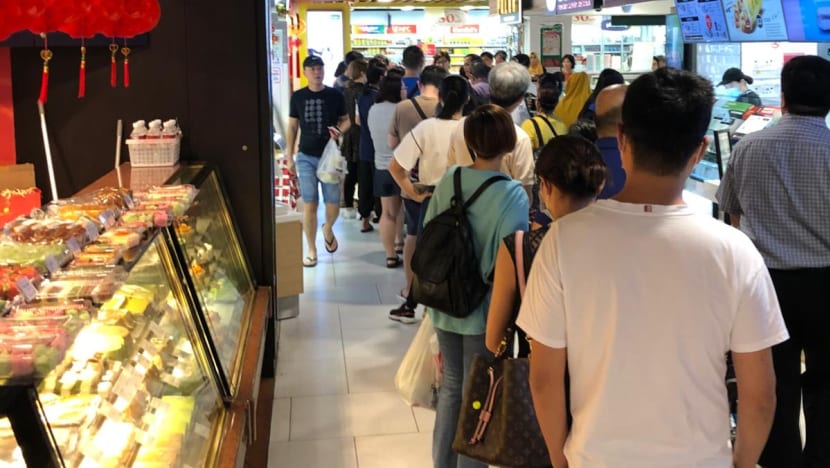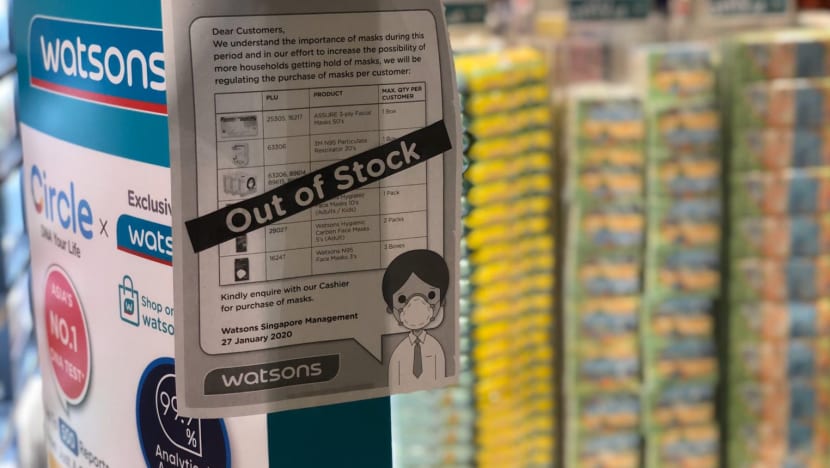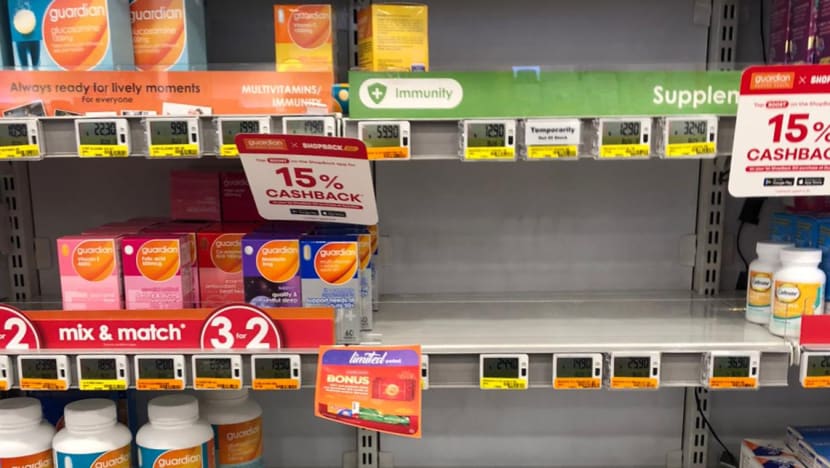Anxiety, confusion, rush for masks: How the Wuhan coronavirus makes people panicky and how to stay calm

People queueing to buy surgical masks at White Sands mall in Pasir Ris on Jan 29, 2020. Those at the end of the queue did not get any after waiting because stocks had run out.
SINGAPORE — They squirrel away surgical masks, get anxious in crowded places and avoid touching potentially contaminated surfaces such as doorknobs and lift buttons. Some, such as 25-year-old Jay Lim, have also taken to giving people who appear unwell a wide berth.
Ever since news broke that there are imported cases of the new coronavirus from Wuhan, China, some Singaporeans such as Mr Lim have felt their anxiety levels go up.
Not being able to get hold of surgical masks at several pharmacies made him feel even more shaken.
“I started getting worried after I read initial conflicting reports on how the virus spreads. I now try to stand 1m to 1.5m away from people who look sick,” Mr Lim, who works part-time as a cleaner, said.
Health experts said that heightened anxiety is not uncommon during an infectious disease outbreak.
Research has shown that an epidemic can take a toll on one’s mental health.
Some of the psychological effects could lead to fear-driven behaviours, such as hoarding and stockpiling medical and healthcare supplies, some of which may hurt efforts to fight disease, experts said. This was a point raised by Trade and Industry Minister Chan Chun Sing on Thursday.
As of Friday evening, the Wuhan coronavirus, also known as 2019-nCov, has infected more than 9,600 people in China and more than 120 people outside of China. There have been more than 200 deaths in China alone. In Singapore, there are 16 confirmed cases as of Friday evening.
Those stricken by coronavirus typically have fever, cough, shortness of breath and breathing difficulties. In more severe cases, it can cause pneumonia and even death.
Older people, and people with pre-existing medical conditions such as asthma, diabetes and heart disease appear to be more vulnerable to becoming severely ill with the virus, the World Health Organization (WHO) said.
It advises people of all ages to take steps to protect themselves from the virus, for example, by following good hand hygiene.
To date, there is no specific medicine recommended to prevent or treat 2019-nCoV.
WHAT SINGAPOREANS HAVE BEEN DOING
In a bid to protect themselves, Singaporeans are snapping up surgical masks, hand sanitisers and immune-boosting oral supplements.
A spokesperson from Watsons said that the sales of surgical masks have gone up 20 times and hand sanitisers, 10 times — compared with the same period last year.
“In response to the increased demand seen in masks and in order to cater masks to as many concerned members of the public as we can, we are regulating the quantity of masks each customer can purchase,” the spokesperson said.

Supermarket chain NTUC FairPrice is also regulating the quantity of masks, hand sanitisers and thermometers to meet rising demand.
“Each customer may buy up to 10 pieces of face masks (surgical or N95), two units of hand sanitisers, two units of thermometers and two packs of thermometer probe covers, subject to availability,” a FairPrice spokesperson said.
Earlier this week, customers who were unable to get hold of these items were left feeling frustrated and anxious.
When TODAY approached Ms Wendy Ding at White Sands mall in Pasir Ris on a weekday afternoon, the 52-year-old financial controller was upset about the lack of surgical masks at pharmacies. The masks she had queued up to buy were sold out within minutes.
Three out of five of her family members, including herself, are down with flu-like symptoms such as cough and sore throat.
“It’s not like I want to stockpile masks, but my family really needs them now as we are all unwell and want to be responsible citizens with the current virus situation,” she said.
“Isn’t there a helpline we can call to request masks? At least people (who really need the masks but can’t get hold them) will be less frightened,” Ms Ding said.
WHAT DOCTORS ARE SEEING
Some doctors said that they are seeing more anxious patients who seeking medical attention for flu-like symptoms.
Dr John Cheng, Healthway Medical Group’s head of primary care, said: “Over the past two weeks, there is a heightened sense of stress among patients, due in large part to the news updates on new cases in China and the region. When it hit closer to home, patients here became more concerned."
However, the public information is important, just as it is for medical staff members to assess every patient for the pre-requisite conditions and manage the situation to alleviate public fears as well as assist those who may be infected with the virus, he said.
With these patients, the doctors will check for fever and respiratory symptoms, in tandem with their recent travel history. Those with symptoms and a travel history to China in the last 14 days will be quarantined, and will be taken to a hospital for more tests, Dr Cheng said.
Infectious diseases physician Leong Hoe Nam of Rophi Clinic at Mt Elizabeth Novena Specialist Centre said that he has encountered patients who are so anxious about being infected by the new coronavirus that it has become their sole concern.
“The moment they have a cough, they think they have the (new coronavirus), as if it is the only illness that exists now and nothing else,” he said. Tuberculosis, influenza, sinusitis and other respiratory tract infections also cause similar symptoms.
Then, there are patients who come down with a cold and they go to see a general practitioner. When they are well enough to work, their employer asks for a letter of undertaking from the doctor to say that they are indeed fit to go back to work.
“That is paranoia to the extreme,” Dr Leong said. “That’s like pushing all the responsibility to the physician. It’s not a realistic expectation of a doctor.”
WHY ARE PEOPLE OVERREACTING?
Mental health experts interviewed by TODAY said that having an increased sense of anxiety is normal during a disease outbreak.
Dr Marcus Tan, consultant psychiatrist at Nobel Psychological Wellness Clinic, a member of Healthway Medical Group, said: “During outbreaks, it is understandable that health-related anxiety may be heightened.
“This is in part due to the uncertainty of the situation at hand as well as the vast amount of information — or misinformation — that is available to the public.”
Dr Adrian Wang, consultant psychiatrist at Gleneagles Medical Centre, said that one’s self-preservation instincts will kick in at the early stages of a health scare.
Anxiety and panic can worsen when there is fear-mongering over social media.
“This is why it is important for the authorities to reassure the public and provide timely updates, which they have been doing,” he said.
WHY ARE PEOPLE HOARDING SUPPLIES?
Dr Tan said that it is “only normal” for people to want to look out for themselves and their significant others, especially in the face of perceived limitations in resources.
This explains why stockpiling or hoarding behaviour happens, as in the case of surgical masks, hand sanitisers, antibacterial hand soap and immunity-boosting supplements.

The fear of missing out could explain why hoarding behaviour occurs.
Dr Tan said: “With no obvious end in sight to the outbreak at this point, it is logical for one to plan for contingencies.
“As we look around at people stocking up supplies that are getting increasingly scarce, and there is no absolute certainty as to when they will be readily available again, the fear of missing out can drive us to adopt similar behaviours.”
WHO ELSE ARE HAVING A BAD TIME?
For people who are excessively worrisome, who are hypochondriacs who have a fear of diseases, or who have an obsessional preoccupation about cleanliness or fear of contamination, news of the virus outbreak can trigger an exacerbation of their condition and symptoms, Dr Tan said.
While it is uncommon for people to take extreme measures, Dr Wang said that his patients with anxiety disorders have resorted to wearing masks, gloves and long-sleeved clothing at the moment.
They have also gone to great lengths not to touch anything such as lift buttons and not to engage in hand-shaking, he said.
HOW EASY IS IT TO CATCH THE VIRUS?
When news went around via social media of the alleged places where people suspected or confirmed to have the virus have been to, it also adds to the paranoia. The authorities have already issued guidelines on how places should be disinfected.
Dr Cheng said that the Wuhan coronavirus is understood to spread much like the common cold, transmitted through close contact — less than 1m — and the person would have to be exposed for longer than 30 minutes to droplet spray produced by sneezing, coughing or talking.
While the virus can also spread through touching a contaminated object or surface before touching one’s eyes, nose or mouth, there is presently no scientific evidence that has determined the duration required to be in contact with the contaminated object for someone to catch the virus, he added.
Dr Cheng said that other transmission factors to consider include the extent of the virus present on the contaminated object.
WHY FEAR-DRIVEN BEHAVIOUR MAKES THINGS WORSE
Like happiness and other emotions, fear and anxiety can be “infectious”.
Add on the conspiracy theories, half-truths, social media hyperboles and fear-mongering, and these could breed further confusion, anxiety and panic.
This, in turn, may lead to behaviours that are counter-productive at a time when collaborative effort is required from the community during an outbreak of infectious disease, the doctors said.
Dr Tan explained that in order to obtain “relief”, a person may choose to selfishly disregard the need to be civic-minded. For instance, storing excess or unused stocks of surgical masks may deprive someone else who needs it.
“This opens up an opportunity for local transmission to occur. That scenario leaves all of us none for the better,” he warned.
Dr Leong said that fear could also cause some people to avoid medical care when they really need it, causing a public health risk.
“They fear that they may pick up the virus when they get into the hospital system. Or they may not come forward when they suspect they have the (coronavirus infection) because they don’t want to be quarantined,’ he said.
HOW TO KEEP CALM AND CARRY ON
The doctors said that the first step to quelling anxiety is to look for transparent, timely, accurate information from credible and reliable sources.
News that seek to sensationalise, dramatise or evoke intense emotions should be taken with some measure of doubt, Dr Tan said.
Dr Cheng advises following official announcements and guidelines from the Ministry of Health during this period.
Dr Wang said: “Be on guard for fake news. And if the news appears sensationalistic, I would think twice before circulating it.
“A case in point: Those sensational pictures and clips of a Chinese woman eating bat meat? It turned out that it wasn’t shot in China.”
While it is difficult to estimate how long this coronavirus outbreak will last, Dr Tan advised the public to take precautionary measures within rational limits, especially on the number of protective and sanitising items they need at home.
After all, the Government has reassured Singaporeans that there is enough stock of protective and sanitisation items, and efforts are being made to get new supplies and ramp up production and distribution.
Each household, for example, may collect a pack of four surgical masks from community centres and Residents’ Committee centres between Feb 1 and 9, as announced by the Government on Thursday.
Dr Leong also repeated the point that health officials have made: Unless you are unwell or when there is local community transmission of the virus, there is no strong need for healthy individuals to use a surgical mask now.
Each person would need just one to two a day, he added. This applies to those who are unwell or when there is active local transmission here.
As of Friday, all the 16 confirmed infected patients were imported cases, having come from Wuhan. This included one Singaporean who returned from there.
The doctors also said that everyone needs to work together to outlast the outbreak.
“Singapore is only as strong as its weakest link, which means everyone must help each other and support those in need,” Dr Leong said.












